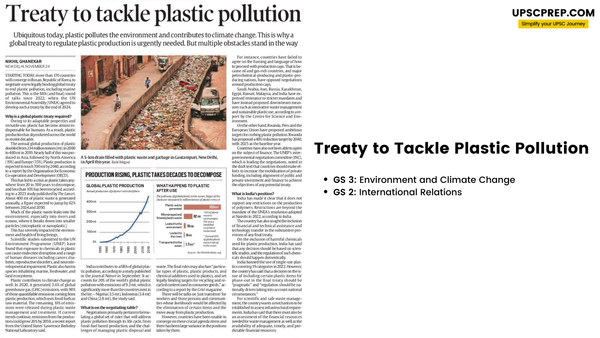Table of contents
Relevance to UPSC Syllabus
- GS 3: Environment and Climate Change
- Pollution and its effects on the environment.
- Waste management and sustainable development.
- Role of international agreements in environmental conservation.
- GS 2: International Relations
- India's position in global negotiations.
- International cooperation and multilateral treaties.
News Article

Background
- Over 170 countries are negotiating a global treaty to tackle plastic pollution under the UN Environmental Assembly (UNEA).
- This is the 5th round of talks, held in Busan, South Korea, aimed at finalizing the treaty by 2024.
- The treaty addresses plastic production, usage, and its environmental impacts.
Why is a global plastic treaty needed?
Exponential Rise in Plastic Production:
- Annual plastic production doubled from 234 million metric tons (2000) to 460 million metric tons (2019).
- Predicted to reach 700 million metric tons by 2040.
Plastic Pollution Issues:
- Plastic takes 200-500 years to decompose.
- Around 400 metric tons of plastic waste generated annually, with 62% growth expected by 2050.
- A significant portion leaks into rivers and oceans, breaking down into microplastics and nanoplastics.
Environmental & Climate Impact:
- Plastic lifecycle contributes 3.9% of global greenhouse gas emissions (GHG), equivalent to emissions from the aviation industry.
- Poor waste management worsens soil, air, and water quality.
Challenges to Framing the Treaty
Global Disagreement on Production Caps:
- Oil & gas-rich nations (e.g., Saudi Arabia, Russia, India): Oppose production caps, suggesting alternatives like innovative waste management and sustainable plastic use.
- Progressive countries (e.g., EU, Rwanda, Peru): Advocate for ambitious targets to curb plastic pollution (e.g., Rwanda's 40% reduction target by 2040).
Finance & Implementation:
- UNEP's draft suggests mobilizing public and private finance to support developing nations.
- Some nations have raised concerns over access to finance and the equitable distribution of resources.
India's Position
- India does not support production caps on plastic and instead focuses on:
- Waste management measures.
- Promoting technological solutions and reducing plastic usage.
- Advocacy for Support:
- Seeks financial and technical assistance for developing countries to implement the treaty.
- Concerns with UNEA Resolution:
- Objected to the Nairobi 2022 resolution due to its lack of emphasis on financial support mechanisms for developing nations.
Key Proposals in the Treaty
- Establishing systems to address:
- Plastic waste leakage into the environment.
- Recycling inefficiencies and disposal practices.
- Developing alternatives to fossil-fuel-based plastics, such as biodegradable plastics.
- Ensuring the availability of funding mechanisms for implementing the treaty.
Key Takeaways
- Urgency: Plastic pollution is a growing threat to ecosystems and climate change mitigation.
- Conflict of Interests: Oil-producing nations and developing countries prioritize economic interests, while progressive nations push for stricter limits.
- Next Steps: Reaching a consensus on production caps, waste management, and financial support is crucial for the treaty's success.
Way Forward:
Comprehensive Treaty Design:
- Address the entire plastic lifecycle from production to disposal.
- Include robust measures for financing and implementation in developing nations.
Balancing Development with Sustainability:
- Developed nations to take responsibility for historical emissions and consumption patterns.
- Developing nations to align with global goals without compromising growth.
India's Role:
- Promote innovative waste management systems (e.g., recycling technologies).
- Leverage the treaty as an opportunity to showcase leadership in global environmental governance.

Existing Laws in India to Tackle Plastic Pollution
India has implemented several policies and regulations to address the challenge of plastic pollution. These laws aim to regulate plastic production, usage, disposal, and recycling to mitigate its environmental impact.
Key Legislations and Rules:
1. Environment Protection Act, 1986
- Umbrella law for the protection and improvement of the environment.
- Empowers the Central Government to take measures to prevent and control pollution, including plastic pollution.
- Forms the basis for implementing plastic waste management rules.
2. Plastic Waste Management Rules, 2016 (Amended in 2018 & 2021)
- Governs the generation, collection, segregation, storage, transportation, processing, and disposal of plastic waste.
- Key Provisions:
- Ban on single-use plastics by 2022.
- Promotes Extended Producer Responsibility (EPR):
- Mandates producers, importers, and brand owners to collect and recycle plastic waste generated by them.
- Compulsory recycling of certain types of plastics.
- Stipulates phased implementation of restrictions on multi-layered packaging.
- 2021 Amendments:
- Prohibition on the manufacture, sale, and use of specific single-use plastics like straws, cutlery, and plastic sticks.
3. Solid Waste Management Rules, 2016
- Regulates the segregation, collection, and disposal of municipal solid waste, including plastic waste.
- Encourages compostable plastics and bio-degradable alternatives to conventional plastics.
- Mandates plastic segregation at the source.
4. Hazardous and Other Wastes (Management and Transboundary Movement) Rules, 2016
- Regulates the safe handling, treatment, and disposal of plastic waste classified as hazardous.
- Prohibits the import of plastic waste into India for disposal.
5. Consumer Protection Act, 2019
- Regulates misleading advertising related to plastic products.
- Promotes awareness about the environmental impact of excessive plastic use.
6. Bureau of Indian Standards (BIS):
- Sets standards for biodegradable plastics and compostable plastics to ensure quality and environmental sustainability.
7. Ban on Single-Use Plastics
- Single-use plastics like carry bags, straws, and cutlery have been prohibited in several states.
- Central government implemented a national-level ban from July 1, 2022.
8. Coastal Regulation Zone (CRZ) Notification, 2011
- Prohibits the dumping of plastic waste and other non-biodegradable materials in coastal areas.
Policy Initiatives:
Swachh Bharat Abhiyan
- Encourages cities to improve waste segregation and recycling mechanisms.
- Drives campaigns to reduce plastic waste in urban and rural areas.
National Framework for Extended Producer Responsibility (EPR)
- Encourages producers to create take-back systems for managing plastic waste.
Judicial Interventions:
- National Green Tribunal (NGT):
- Proactively monitors and penalizes non-compliance with plastic waste rules.
- Ban on plastic bags below a certain thickness (50 microns) to reduce non-recyclable waste.
- Supreme Court:
- Recognized plastic pollution as a threat to the environment and directed strict enforcement of waste management laws.
Challenges in Implementation
- Poor Enforcement: Lack of monitoring at the municipal and industrial levels.
- Lack of Awareness: Limited public understanding of segregation and recycling.
- Inadequate Infrastructure: Insufficient facilities for plastic waste management and recycling.
- Dependence on Single-Use Plastics: High usage in rural and urban areas due to affordability.
Way Forward
- Strengthening EPR mechanisms with stringent penalties for non-compliance.
- Encouraging biodegradable alternatives and compostable materials.
- Promoting awareness campaigns about sustainable consumption and waste segregation.
- Improving recycling infrastructure and technology.
UPSC Practice Questions
Mains Question:
- "Discuss the significance of a global treaty on plastic pollution in combating environmental degradation and climate change. Critically analyze India’s position in such negotiations."
Prelims Objective Areas to focus:
- UNEA and its role in environmental governance.
- Key statistics on plastic pollution and waste management challenges.

